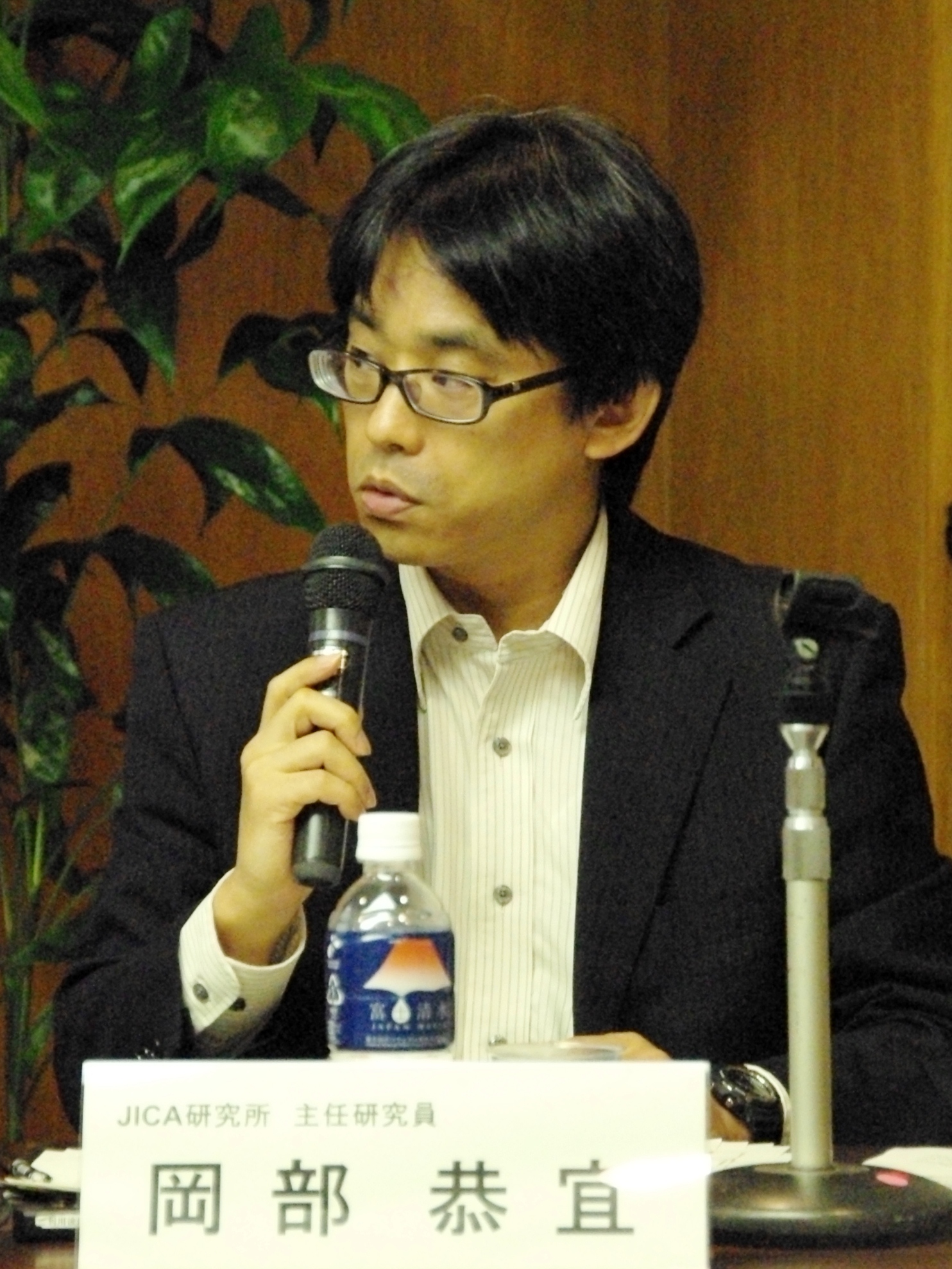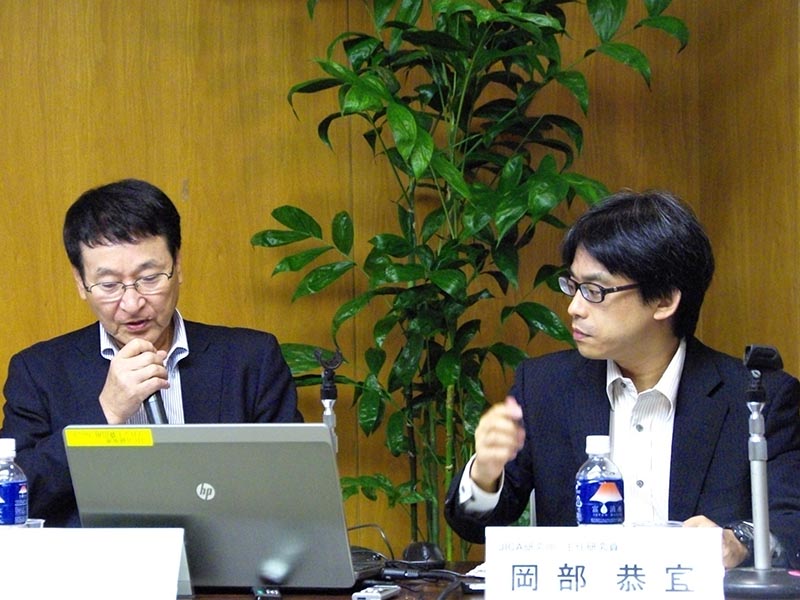JICA-RI Organizes the First Seminar of JOCV Study: "Review a Half Century of JOCV Program"
2013.09.26
JICA’s Japan Overseas Cooperation Volunteers (JOCV) program, since its inauguration in 1965 by the Japanese government, has dispatched more than 38,000 volunteers to 88 countries around the world. The program, which is to celebrate its 50th milestone anniversary in 2015, includes a range of objectives such as development aid, mutual understanding between Japan and developing countries, and fostering the youth. JOCV program, therefore, has drawn attention not only from its practical aspect but from an academic interest.
In light of the nature of JOCV program, JICA-RI launched a research project titled “the Interdisciplinary Study of JOCVs” at the end of 2011, having engaged in the study on the JOCV program from various academic fields—political science, anthropology, business administration, and sociology. On September 19 this year, the institute convened its first series of seminars with an aim of disseminating the study outcomes and of building a research network. JICA-RI Senior Research Fellow Yasunobu Okabe, who is a lead researcher of this project, and Mr. Yozo Kaneko, President of the Japan Overseas Cooperative Association (JOCA), gave presentations respectively.
In his opening remarks, JICA-RI Director Hiroshi Kato stated, “ODA is a multifaceted program involving diverse motivations, activities, and skills. So it is difficult to grasp a full picture of its work, whereas ODA scheme needs to be interpreted from diverse and long-term perspectives.”

Senior Research Fellow
Yasunobu Okabe
Mr. Kaneko started off by tracing the path to the establishment of the JOCV program in his speech titled “Progress of JOCV over a Half Century.” First he stated that although a general perception of JOCV was a replication of the US Peace Corps that started in 1961, Japanese private youth groups and university persons involved had already discussed a plan to dispatch Japanese youth overseas, a model of the current JOCV program before the US Peace Corps. The start of the US Peace Corps by the late President Kennedy inspired LDP’s young politicians to realize the JOCV framework. With setting up the Cooperation Volunteers Secretariat as an affiliated agency of OTCA (predecessor of JICA) in 1965, about 40 volunteers were dispatched to five foreign countries in the first year. Mr. Kaneko, former executive director of JOCV secretariat, also illustrated the history of JOCV: the foundational period spanning from the launch of the program to the establishment of JICA (1974); the expanding period of the program (from 1975 to the 1990s); and the post-bubble period from 2000 to the present. To end his presentation, Mr. Kaneko lastly stressed that the JOCV program has been striving to develop the program as a national movement within the framework of governmental projects and to utilize the cooperation with external agencies such as JOCA as a driving force.
Senior research fellow Okabe’s presentation followed Mr. Kaneko, focusing on the history of the foundation of JOCV. He explained it by setting three agendas: 1) the motives to establish the JOCV program; 2) the diverse objectives such as technical cooperation and cultivation of Japanese youth; and 3) the driving force for continuous development of the program. He showcased Japan-US relation under the Cold War, employment issue of the youth in urban and rural areas, and the leadership of the youth groups and politicians as the factors of its foundation. As a factor of diverse objectives, he pointed out that it was a product of compromise among the youth groups, LDP and the Ministry of Foreign Affairs. He analyzed the factors of the third agenda that institutional complementarity worked out because the JOCV program was positioned under ODA framework between the Ministry of Foreign Affairs and JICA, as well as the effective checking system by external organizations including the youth groups and politicians. Lastly, Okabe expressed his intention to work further on a comparative study with cases of other Western countries.

Mr. Yozo Kaneko, President of JOCA(left)
Okabe Senior Research Fellow(right)
During the Q and A session that followed the presentations, audience from a broad range of age group asked questions, such as on current attention of Japanese politicians on JOCV, and on types of previous jobs engaged by the JOCV members at the time of their dispatch. The view that former JOCV members, their families, JOCA, and the youth groups helped the program sustain was also raised from the floor. In response to the questions and comments, Mr. Kaneko lastly touched on a few challenges such as job security for the JOCVs after their return, and the need to review the selection process in recruiting JOCVs.

事業事前評価表(地球規模課題対応国際科学技術協力(SATREPS)).国際協力機構 地球環境部 . 防災第一チーム. 1.案件名.国 名: フィリピン共和国.

事業事前評価表(地球規模課題対応国際科学技術協力(SATREPS)).国際協力機構 地球環境部 . 防災第一チーム. 1.案件名.国 名: フィリピン共和国.

事業事前評価表(地球規模課題対応国際科学技術協力(SATREPS)).国際協力機構 地球環境部 . 防災第一チーム. 1.案件名.国 名: フィリピン共和国.

事業事前評価表(地球規模課題対応国際科学技術協力(SATREPS)).国際協力機構 地球環境部 . 防災第一チーム. 1.案件名.国 名: フィリピン共和国.

事業事前評価表(地球規模課題対応国際科学技術協力(SATREPS)).国際協力機構 地球環境部 . 防災第一チーム. 1.案件名.国 名: フィリピン共和国.
scroll